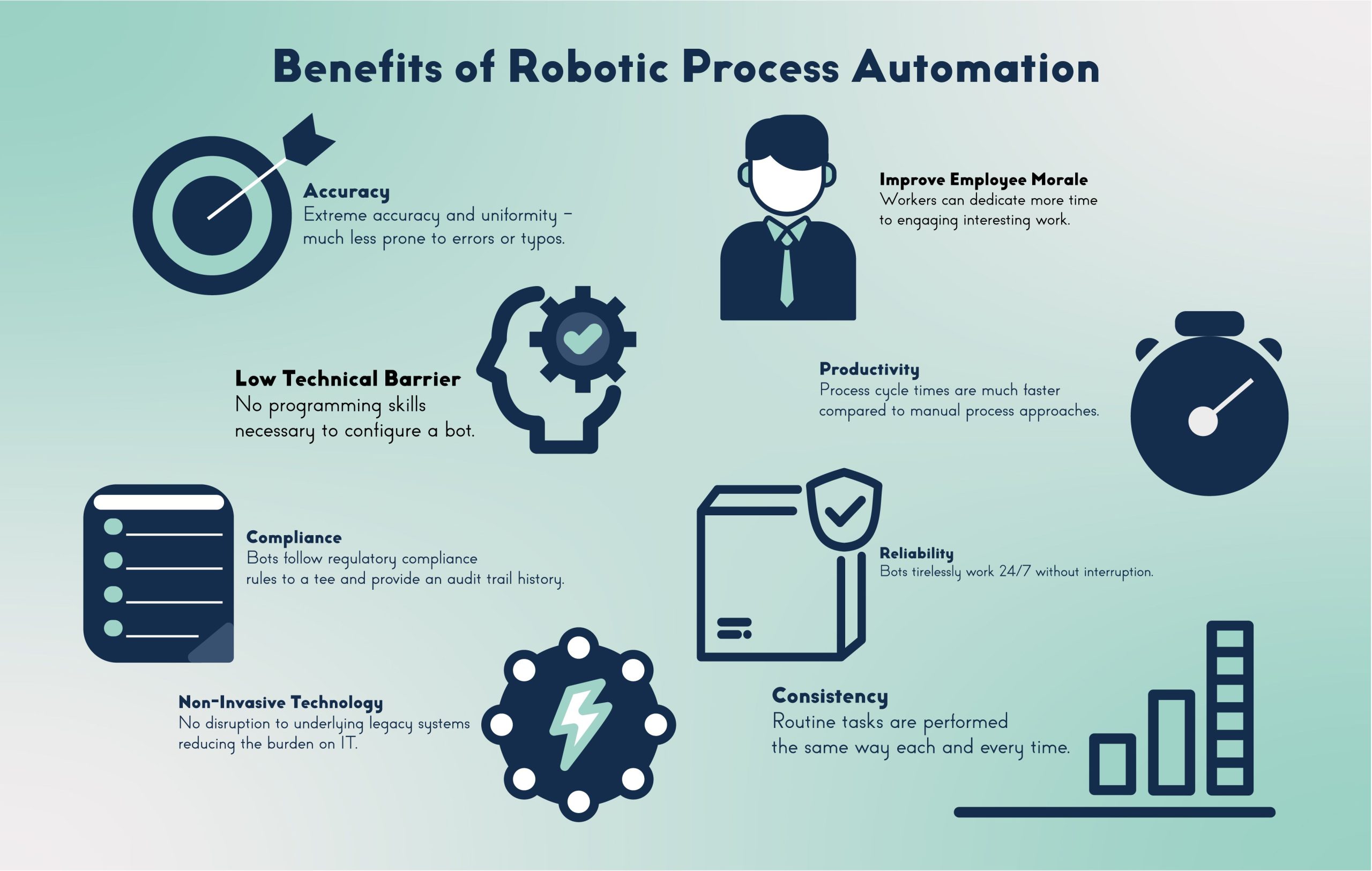Benefits of Robotic Process Automation
Robotic Process Automation (RPA) has emerged as a transformative technology that streamlines business processes and enhances operational efficiency. In this article, we will explore the numerous benefits of RPA and how it can revolutionize your organization.
Increased Productivity
RPA enables businesses to automate repetitive and mundane tasks, allowing employees to focus on more strategic and value-added activities. By deploying software robots to handle routine tasks, organizations can significantly increase productivity and reduce human errors. This leads to faster task completion, improved accuracy, and enhanced overall efficiency.
Cost Savings
Implementing RPA can result in substantial cost savings for organizations. By automating manual processes, businesses can reduce labor costs, minimize operational expenses, and optimize resource allocation. RPA eliminates the need for human intervention in repetitive tasks, reducing the risk of errors and associated costs. Moreover, RPA solutions are highly scalable, allowing businesses to handle increased workloads without incurring additional expenses.
Improved Accuracy and Compliance
Human errors can have significant consequences in critical business processes. RPA eliminates the risk of human error by executing tasks with precision and accuracy. By enforcing standardized processes and business rules, RPA ensures compliance with regulatory requirements. This not only enhances operational efficiency but also mitigates compliance-related risks.
Enhanced Customer Experience
Delivering exceptional customer experiences is crucial for businesses to thrive in today’s competitive landscape. RPA plays a vital role in enhancing customer experience by automating customer-facing processes. By automating tasks such as data entry, order processing, and customer support, businesses can provide faster response times, improved service quality, and personalized interactions. This leads to increased customer satisfaction and loyalty.
Scalability and Flexibility
RPA solutions are highly scalable and flexible, allowing businesses to adapt to changing requirements and handle increased workloads. Whether it’s scaling up to accommodate business growth or scaling down during lean periods, RPA provides the agility required to meet dynamic business needs. RPA can seamlessly integrate with existing systems and applications, enabling organizations to leverage their existing technology investments.
Improved Employee Satisfaction
By automating repetitive and mundane tasks, RPA frees up employees’ time and allows them to focus on more meaningful and engaging work. This not only improves job satisfaction but also enables employees to develop new skills and contribute to more strategic initiatives. RPA empowers employees to become more productive and innovative, leading to a positive work culture and higher employee retention rates.

Robotic Process Automation offers numerous benefits that can revolutionize the way organizations operate. From increased productivity and cost savings to improved accuracy and customer experience, RPA provides a competitive edge in today’s fast-paced business environment. By embracing RPA, businesses can unlock their true potential, drive growth, and achieve operational excellence.
Frequently Asked Questions about Benefits of Robotic Process Automation
1. What is Robotic Process Automation (RPA)?
Robotic Process Automation (RPA) is the use of software robots or artificial intelligence to automate repetitive tasks, streamline workflows, and improve operational efficiency.
2. What are the key benefits of implementing RPA?
The benefits of implementing RPA include increased productivity, improved accuracy, cost savings, enhanced customer experience, and the ability to free up human employees to focus on higher-value tasks.
3. How does RPA increase productivity?
RPA increases productivity by automating time-consuming and repetitive tasks, allowing employees to work on more strategic and creative initiatives. It can perform tasks faster and more accurately than humans, leading to increased efficiency.
4. Can RPA improve accuracy in business processes?
Yes, RPA can significantly improve accuracy in business processes. By eliminating human errors and ensuring consistent execution of tasks, RPA reduces the chances of mistakes and improves overall data quality.
5. What cost savings can be achieved through RPA?
RPA can lead to significant cost savings by reducing labor costs, minimizing manual errors, and improving operational efficiency. It eliminates the need for manual data entry and allows businesses to achieve more with fewer resources.
6. How does RPA enhance customer experience?
RPA enhances customer experience by enabling faster response times, reducing processing errors, and improving service quality. It allows businesses to provide quicker and more accurate customer support, leading to higher customer satisfaction.
7. Can RPA be integrated with existing systems?
Yes, RPA can be easily integrated with existing systems. It can work with a wide range of applications, databases, and software platforms, making it a versatile solution for automating various business processes.
8. Is RPA suitable for all types of businesses?
RPA can benefit businesses across various industries and sectors. It is particularly useful for organizations that deal with high volumes of repetitive tasks, such as finance, healthcare, logistics, and customer service.
9. Does RPA require extensive programming knowledge?
No, RPA does not require extensive programming knowledge. Many RPA tools provide a user-friendly interface that allows business users to design and deploy automation workflows without the need for complex coding.
10. How long does it take to implement RPA?
The implementation time for RPA can vary depending on the complexity of the processes being automated and the size of the organization. However, with the right planning and support, RPA implementation can be done within a few weeks to a few months.




